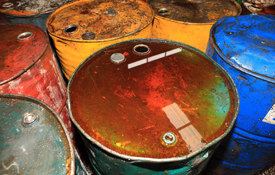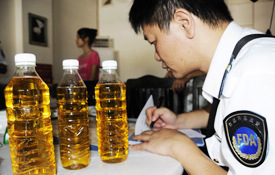|
 |
 |
|
HAZARDOUS WASTE: Unprocessed gutter oil found by the police in Gelin Bio-Energy Co. Ltd. in Shandong Province (XINHUA) |
OIL SAFETY: A food safety regulator registers cooking oil samples at a restaurant in Nanning, Guangxi Zhuang Autonomous Region, on September 17 (XIANG ZHIQIANG) |
Experts said that the failure to find a reliable detection method shows that the solution to the edible oil problem is systematic monitoring.
As part of the crackdown on substandard cooking oil, the police announced on September 13 the arrest of 32 criminal suspects for allegedly producing and selling gutter oil.
More than 100 tons of gutter oil was seized after the police busted a criminal network spanning 14 provinces, the Ministry of Public Security said in a statement.
"In less than two years, more than 10,000 tons of gutter oil entered the market. We are still probing the case," Hong Jufeng, a police officer involved in the crackdown, told Xinhua News Agency.
The police began their investigation in March after residents in Ninghai County, eastern Zhejiang Province, reported that a group of people were buying leftover oil from local restaurants.
The 32 criminal suspects were caught in a cross-province raid in mid-July, when police officers from Zhejiang, Shandong and Henan provinces jointly busted six underground workshops and two illegal production lines, police authorities said.
Oil is used extensively in Chinese cuisine and the country's 1.3 billion population means that enormous quantities of cooking oil are used annually. Ensuring the proper disposal of all this oil is a major national concern.
" China consumes over 22.5 million tons of cooking oil per year," said He Dongping, a professor at Wuhan Polytechnic University. He also estimated that one out of every 10 restaurant meals was probably cooked in waste oil.
Although it poses serious health hazards on the dining table, gutter oil is an ideal raw material for producing rubber, soap, cosmetics and bio-fuel.
Across China, several companies have been licensed to collect gutter oil for reprocessing into soap, fuel and other products.
During the latest gutter oil crackdown, however, Gelin Bio-Energy Co. Ltd. in Shandong Province, a bio-diesel firm licensed to collect waste cooking oil for use in fuel, was accused of selling reprocessed gutter oil back to restaurants. Investigators found more than 100 tons of gutter oil in various stages of processing at the company. Company heads admitted gutter oil provided a better return than bio-diesel that the company originally produced.
Many bio-diesel firms are simply being forced out of business. Illegal collectors of kitchen waste oil pay restaurants high prices for monopoly rights, making bio-diesel companies' production neither profitable nor sustainable.
Zhou Kequan, President of a bio-diesel company in Foshan, Guangdong Province, told the Southern Metropolis Daily that his company could only purchase 200 tons to 300 tons of kitchen waste oil per month, far below its designed processing capacity.
Zhou said that just five years ago, kitchen waste oil was sold at 1,600 yuan ($250) per ton and the profit for producing bio-diesel out of waste oil was 2,200 yuan ($344) per ton. Nowadays, kitchen waste oil is sold at between 5,500 yuan ($859) and 6,000 yuan ($937.5) per ton and bio-diesel production has become unprofitable.
Many companies pooled money to fund bio-diesel factories in 2007 and 2008 due to government incentives. But 90 percent of them have closed down due to a lack of raw material. Only about a dozen bio-diesel factories have survived and are struggling for life.
Lu Huan is vice president of a bio-diesel company based in Guangzhou, Guangdong Province. Though the city has only two companies that are licensed to process kitchen waste, Lu said that the processing line of his company has been idle for years due to its inability to collect enough kitchen waste.
Lu said he hoped that more companies could join the industrial chain of kitchen waste processing. "The collection, storage and processing of kitchen waste should be undertaken by different companies so that bio-diesel companies can focus on processing," he said.
Lin Jianmin, a senior researcher with the Research Institute of Petroleum Processing under Sinopec Corp., said that to ensure the development of the bio-diesel industry, the most urgent task for the government is to improve legislation on the disposal of kitchen waste, in order to prevent gutter oil from making its way to dining tables and make waste cooking oil more affordable for bio-diesel companies.
The government has made some legislative efforts to resolve the gutter oil problem over the past few years, which Zhou said had succeeded in easing the waste-oil shortages faced by bio-diesel companies somewhat. Despite this, the laws and regulations have not been well implemented and kitchen waste continues to fetch a high price.
"I believe that with the improvement of people's living standards and social ethics and more attention from the government, the gutter oil problem will eventually be eradicated," said Professor He at Wuhan Polytechnic University. | 